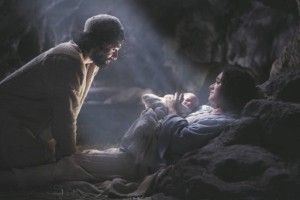RT: Why I Still Believe in the Virgin Birth of Christ
It’s been a troublesome week. I admittedly write this to you after shedding many tears over the tragedy at Newtown, Connecticut. We could focus on the questions of “why” and “how.” But, now, I feel we should focus on the hope of Christmas. Why? Because, Jesus was born into a dark world. The world, since the inception of sin, has always been a dark place to live. This recent tragedy reminded us of the depravity of humankind. My wife even said, “Just when you think that it can not get any worse, it does.”
Jesus came to bring light into a world that is depraved. As John wrote,
1 In the beginning was the Word, and the Word was with God, and the Word was God. 2 He was in the beginning with God. 3 All things came into being through Him, and apart from Him nothing came into being that has come into being. 4 In Him was life, and the life was the Light of men. 5 The Light shines in the darkness, and the darkness did not comprehend it. (New American Standard Bible: 1995 Update (LaHabra, CA: The Lockman Foundation, 1995), Jn 1:1–5).
It is especially important that we remember the light of Christ in this ever-darkening world. So, it is with this in mind, that I bring to you today seven reasons why I still believe in the Virgin Birth of Christ. The fact that I, skeptically minded as I have been, came to trust the Scriptures should give you reason to believe, as well. It is in the belief of Christ’s reality that we are brought ultimate hope.
1. I still believe in the Virgin Birth of Christ because…of the Presence of the Birth Narrative (in Lieu of the Absence of Stories of Christ’s Early Life).
Ancient biographies were not like modern biographies. Ancient biographers mainly focused on the main details of the “biographee’s” life. This may explain why there is almost a complete absence of information concerning the early life of Jesus. The gospel biographers, or “evangelists,” were mainly concerned about the ministry, death, and resurrection of Jesus of Nazareth. In lieu of the absence of stories concerning Christ, we have the birth narrative positioned towards the beginning of Matthew and Luke’s gospels.
Some will argue that other great leaders of antiquity had grand birth stories concerning those leaders. While this is a good argument, several differences exist in Christ’s birth narrative. Many legends concerning other birth stories show a physical linkage between a god and a human woman. This is not the case in the birth story of Christ. No physical experience exists in the essence of physical relations. It is a supernatural, spiritual event. It seems that God created Mary with a fertilized egg from birth. In the story of Jesus, you have real historical events surrounding the birth of Christ. This adds to the validity of the story.
2. I still believe in the Virgin Birth of Christ because…of the Personal Testimony of Mary.
Luke is an ancient historian par excellence. Luke writes in the prologue to his gospel,
1 “Inasmuch as many have undertaken to compile an account of the things accomplished among us, 2 just as they were handed down to us by those who from the beginning were eyewitnesses and servants of the word, 3 it seemed fitting for me as well, having investigated everything carefully from the beginning, to write it out for you in consecutive order, most excellent Theophilus; 4 so that you may know the exact truth about the things you have been taught.” (New American Standard Bible: 1995 Update (LaHabra, CA: The Lockman Foundation, 1995), Lk 1:1–4….underscore and italics mine).
Luke tells us in the prologue that he “investigated everything carefully” from “eyewitnesses and servants of the word.” With this in mind, we find an interesting statement towards the end of the annunciation in chapter 2. Luke writes, “But Mary treasured all these things, pondering them in her heart” (New American Standard Bible: 1995 Update (LaHabra, CA: The Lockman Foundation, 1995), Lk 2:19). Literally, “συμβάλλουσα ἐν τῇ καρδίᾳ αὐτῆς” (The Greek New Testament: Logos Bible Software) or “debate seriously (or think intensely) in the heart of hers.” How would Luke know this if it were not for the very testimony of Mary? Of course, Mary could have lied. But, if so, wouldn’t she have a character that would show otherwise? Upright and honest people normally do not make up these kind of things.
In addition to this, the gospel writers did not have to add a birth narrative. They could have written as Mark and John did and started the biography of Jesus with John the Baptist’s preaching and with Christ’s own baptism. Why record the birth narrative of Jesus, and especially the Virgin Conception, if there was no truth involved in the story? For those who were trying to show the truthfulness of the life of Christ, recording an event that was not true would not seem to help their case.
3. I still believe in the Virgin Birth of Christ because…of the Proof of Biological Occurrences.
Some skeptics will claim, “It is impossible for a person to conceive a child while remaining a virgin.” Not so fast Tonto! A biological phenomena exists called “parthenogenesis.” “Parthenos” means “virgin” and “genesis” (yes, like the first book of the Bible) means “beginnings.” This phenomenon has been documented, although extremely rare, in sharks, monitor lizards, and supposedly even in rabbits. According to some researchers, it has been shown to be possible for parthenogenesis to occur in humans due to the research on stem cells by Dr. Hwang Woo-Suk of South Korea. (See Wikipedia article given at the end of the article.)
Some will claim that the offspring will almost always be a female. However, those same critics would have earlier claimed that parthenogenesis was impossible. The fact is that we are continuously learning more about how God works and creates. So, it would be no impossible task for God to have changed an “X-chromosome” to a “Y-chromosome” to make a male parthenogenic offspring. A simple mutation in one of the “X-chromosomes” would do the trick. The fact that biology is opening up to show the possibility of such an event adds to the validity of the Virgin Birth story.
Note: Some skeptics will also use the same mentality towards the resurrection of Christ. Many, using Humean philosophical logic, will claim that dead people just do not rise. However, what do you do with the 100 plus medically confirmed cases where men, women, and children have died, experienced heaven, and came back to life? Like the resurrection, one can no longer hold that the Virgin Birth is impossible. You may say that it’s highly improbable, but not impossible.
4. I still believe in the Virgin Birth of Christ because…of the Providential Creation “Ex Nihilo.”
Moses writes in Genesis, “In the beginning God created the heavens and the earth” (New American Standard Bible: 1995 Update (LaHabra, CA: The Lockman Foundation, 1995), Ge 1:1). John the apostle writes, ”
1″In the beginning was the Word, and the Word was with God, and the Word was God.
2 He was in the beginning with God.
3 All things came into being through Him, and apart from Him nothing came into being that has come into being” (New American Standard Bible: 1995 Update (LaHabra, CA: The Lockman Foundation, 1995), Jn 1:1–3).
Dr. William Lane Craig has popularized what is called the “Kalaam Cosmological Argument.”
“1. Everything that begins to exist has a cause.
2. The universe began to exist.
3. Therefore, the universe has a cause” (http://www.reasonablefaith.org/the-new-atheism-and-five-arguments-for-god).
Scientific evidence as well as mathematical theorems prove that the universe came from nothing…not no one. God is the reason for the universe, physics, and the laws of nature’s existence. So, what does this do with the Virgin Conception of Christ? If God can create everything that exists (molecules, laws of nature, logic, and the billions of information that constructs your very own DNA), why would it be such an impossibility for God to allow for a Virgin Conception?
5. I still believe in the Virgin Birth of Christ because…of the Proclamation of Early Biblical Writers.
Matthew was most likely written by the apostle who was a tax-collector. It was common in Jesus’ day for rabbis to have individuals record their teachings. Especially since Jesus was an evangelist, He would have preached many of His messages on multiple occasions. It is of no surprise that perhaps Matthew and others recorded the words of Christ. According to external and internal evidence, Matthew was the author of the first gospel. Matthew records the birth of Christ.
Luke, although not an eyewitness, was a historian who was a companion of the Apostle Paul. Luke reports that he used eyewitness testimony to construct his gospel. Luke could have been written no later than AD 64. Why? Well, Luke ends the book of Acts, the sequel to the Gospel of Luke, with these words,
“When we entered Rome, Paul was allowed to stay by himself, with the soldier who was guarding him. 17 After three days Paul called together those who were the leading men of the Jews, and when they came together, he began saying to them, “Brethren, though I had done nothing against our people or the customs of our fathers, yet I was delivered as a prisoner from Jerusalem into the hands of the Romans” (New American Standard Bible: 1995 Update (LaHabra, CA: The Lockman Foundation, 1995), Ac 28:16–17).
“And he stayed two full years in his own rented quarters and was welcoming all who came to him,
31 preaching the kingdom of God and teaching concerning the Lord Jesus Christ with all openness, unhindered” (New American Standard Bible: 1995 Update (LaHabra, CA: The Lockman Foundation, 1995), Ac 28:30–31).
Luke records the house arrest of Paul in AD 64. Paul was executed in AD 67. So, from this information we can know the general dating of Luke and Matthew, as well as Mark. Since Acts is the sequel to Luke’s gospel and Acts was written in AD 64, then Luke must have been written around AD 60. If Luke used information from Matthew, Matthew must have been written in the late 50s. If Matthew used Mark’s gospel for the completed version of his gospel, then Mark must have been written at least by the mid-50s. Some have even postulated a dating for Mark in the 40s.
So what we have in Matthew and Luke is early testimony concerning the life of Jesus. This adds evidence to the story, as amazing as it is, that Jesus may have indeed been born by a Virgin.
6. I still believe in the Virgin Birth of Christ because…of the Presentation of Extra-Biblical Writers.
Extra-biblical writers also record the Virgin Birth of Christ. According to Caner and Hindson, Ignatius writes about the Virgin Birth of Christ. Ignatius wrote this around AD 110 and refers to the Virgin birth as a “well established fact.” The Apostle’s Creed is based upon a baptismal confession of AD 117. The creed refers to the Virgin Birth of Christ. Aristides (AD 125), Justin Martyr (AD 150), Irenaeus (AD 170), Tatian (AD 170), Clement of Alexandria (AD 190), and Tertullian (AD 200) all refer to the Virgin Birth of Christ (Ergun Caner and Ed Hindson,”The Popular Encyclopedia of Apologetics” (Eugene, OR: Harvest House, 2008), 142). It appears that the Virgin Birth of Christ was a well-established fact. As occurs with modern history, serious speculation does not occur until modern times due to an unnatural attachment to naturalism.
7. I still believe in the Virgin Birth of Christ because…of the Prophecy of Isaiah.
Isaiah gives a prophecy that could very well refer to the Messiah’ virgin birth. Isaiah writes in Isaiah 7:14,“Therefore the Lord Himself will give you a sign: Behold, a virgin will be with child and bear a son, and she will call His name Immanuel” (New American Standard Bible: 1995 Update (LaHabra, CA: The Lockman Foundation, 1995), Is 7:14). Some versions translate the term “almah” with “young woman” instead of “virgin.” However, even if this is the case, the word points to a woman who is most likely prior to the age of marriage (Ergun Caner, Ed Hindson, “The Popular Encyclopedia of Apologetics” (Eugene, OR: Harvest House, 2008) 143). The age for marriage was around 13 years of age in Jesus’ day. Mary was most likely around 12 to 13 years of age when she conceived Jesus. Therefore, Isaiah still indicates a supernatural intervention in the birth of Jesus our Messiah.
Conclusion:
As Dr. Frank Turek implies in his blockbuster book, “I Don’t Have Enough Faith to be an Atheist.” I don’t have enough faith to deny the Virgin Birth of Christ. As I stated in the beginning, Jesus is the light of the world. He came so that we could live with God eternally. He brought light to a dark, dreary world. This Christmas, despite the tragedies world-wide, let us celebrate the victory of Christ. Let us celebrate that death is not the ending, but the beginning of a new, wonderful life with our God. This should bring comfort to those who are hurting…comfort in knowing that those children who died are now safely in the loving arms of the God who can work wonders; the God of love; the God of creation. Let us celebrate life this Christmas; the life of Christ and the life that we can have in Him.
God bless and have a very, Merry Christmas,
Pastor Brian Chilton
Taking it Deeper:
Check out the Wikipedia entry on “parthenogenesis.” http://en.wikipedia.org/wiki/Parthenogenesis
Caner, Ergun, PhD, and Ed Hindson, PhD, “The Popular Encyclopedia of Apologetics” (Eugene, Oregon: Harvest House, 2008).
“The Case for Christ” by Lee Strobel.
“The New Evidence that Demands a Verdict” by Josh McDowell.
“Reasonable Faith” by William Lane Craig.
Lea, Thomas D., Ph.D. and David Alan Black, Ph.D., “The New Testament: It’s Background and Message, 2nd ed.” (Nashville, Tennessee: Broadman and Holman Academic, 2003).






Reblogged this on Pastor Brian Chilton and commented:
Here is an article that was posted last December. It lists the reasons why this writer still believes in the Virgin Birth of Christ. God bless and remember that Jesus is the reason for the holiday season.